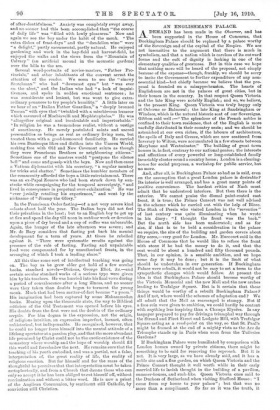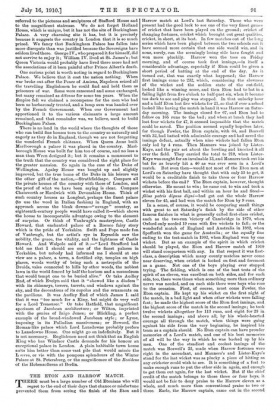AN ENGLISHMAN'S PALACE.
A DEMAND has been made in the Observer, and has
A
been supported in the House of Commons, that Buckingham Palace should be replaced by a palace worthy of the Sovereign and of the capital of the Empire. We are not insensitive to the argument that there is much in symbolism, and that a nation which is careless of its outward forms and the cult of dignity is lacking in one of the elementary qualities of greatness. But in this case we hope that nothing more will be heard of the proposal, not simply because of the expense—though, frankly, we should be sorry to incite the Government to further expenditure of any non- essential kind—but chiefly because we believe that the pro- posal is founded on a misapprehension. The hearts of Englishmen are not in the palaces of great cities, but in their homes in the country. In that respect Queen Victoria and the late King were notably English ; and so, we believe, is the present King. Queen Victoria was truly happy only at Osborne or Balmoral ; the late King at Sandringham or Windsor, which is the natural historic seat of our Sovereigns.
Gibbon said well :—" The splendour of the French nobles is confined to their town residence, that of the English is more usefully distributed in their country seats; and we should be astonished at our own riches, if the labours of architecture, the spoils of Italy and Greece, which are now scattered from Inverary to Wilton, were accumulated in a few streets between Marybone and Westminster." The building of great town houses is, in fact, contrary to our national genius; the interests and affections of every powerful or long-established family invariably cluster round a country home ; London is a clearing- house for social purposes, a workshop for public service, but no more.
And, after all, is Buckingham Palace so bad as is said, even
on the assumption that a great London palace is desirable? Its interior is well arranged, and has a great many points of positive convenience. The hardest critics of Nash must admit that he understood interiors. But then there is the exterior. We cannot praise the dismal paint-coated east front, it is true ; the Prince Consort was not well advised in the scheme which be carried out with the help of Blore. The Shah of Persia who visited London in the "seventies" of last century was quite illuminating when he wrote in his diary : "I thought the front was the back." But the north side has been underrated ; and as for size, if that is to be held a consideration in the palace we require, the site of the building and garden covers about fifty acres,—very good for London. Mr. Harcourt said in the House of Commons that he would like to reface the front with stone if he had the money to do it, and that the cost would be about a hundred and fifty thousand pounds. That, in our opinion, is a sensible ambition, and we hope some day it may be done ; but it is the limit of what should be undertaken in our generation. If Buckingham Palace were rebuilt, it would not be easy to set a term to the sympathetic changes which • would follow. At present the idea is that Buckingham Palace should become worthy of the Victoria Memorial and the new Mall and the new arches leading to Trifalgar Square. But is it certain that these things would be worthy of a rebuilt Buckingham Palace ? And if not, where would the schemes of adaptation end ? We all admit that the Mall as rearranged is stumpy. But if a free rein were given to ambition, we could hardly be content with anything less inspiring than a Champs Elysees. Is any taxpayer prepared to pay for driving a triumphal way through the Strand and Fleet Street and Ludgate Hill, with Trafalgar Square acting as a rond-point on the way, so that St. Paul's might be framed at the end of a mighty vista as the Arc de Triomphe stands up in Paris when seen from the Tuileries Gardens ?
If Buckingham Palace were humiliated by comparison with London houses owned by private citizens, there might be something to be said for removing the reproach. But it is
not. It is very large, as we have already said, and it has a noble site and a fine garden, on which Queen Victoria and the Prince Consort thought it well worth while in their early married life to lavish thought in the building of a pavilion, summer-houses, and such-like. Queen Victoria once said to the Duchess of Sutherland when visiting Stafford House : " I come from my house to your palace".; but that was no more than a compliment. So far as it was the truth, it
referred to the pictures and sculptures of Stafford House and to the magnificent staircase. We do not forget Holland House, which is unique, but it has not the site of Buckingham Palace. A very charming site it has, but it is precisely because it suggests the country in London that it is so much prized. We fancy that Buckingham Palace has fallen into more disrepute than was justified because the Sovereigns have seldom lived there. George IV., who prepared it for himself, did not survive to enjoy it; William IV. lived at St. James's ; but Queen Victoria would probably have lived there more had not the associations of it been painful after Prince Albert's death.
One curious point is worth noting in regard to Buckingham Palace. We believe that it cost the nation nothing. When war broke out after the Peace of Amiens, Napoleon seized all the travelling Englishmen he could find and held them as prisoners of war. Some were ransomed and some exchanged, but many remained as &terms for some ten years. When the Empire fell we claimed a recompense for the men who had been so barbarously treated, and a lump sum was handed over by the French Government. When our Government had apportioned it to the various claimants a large amount remained, and that remainder was, we believe, used to build Buckingham Palace.
There is no land in the world where the thoughts of those who can build fine houses turn to the country so naturally and eagerly as they do in England, though we are not forgetting the wonderful French chateaux. When Queen Anne built Marlborough a palace it was placed in the country. Marl- borough House was built for him too of course, and no less a man than Wren designed it; but it remains a monument to the truth that the country was considered the right place for the greater mansion. So again in the case of the Duke of Wellington. Apsley House was bought up and slightly improved, but the true home of the Duke in his leisure was the other gift of the nation,—Strathfieldsaye. Compare all the private houses of the country with those of London, and the proof of what we have been saying is clear. Compare Chatsworth or Hardwick with Devonshire House. Think of such country houses as Longleat, perhaps the finest palace (to use the word in Italian fashion) in England, with an approach across the bleak downs—" savage " country, as eighteenth-century people would have called it—which shows the house to incomparable advantage owing to the element of surprise. Or think of Vanbrugh's masterpiece, Castle Howard, that enchanted palace of a Rococo fairy story which is the pride of Yorkshire. Swift and Pope made fun of Vanbrugh, but the artist's eye in Reynolds saw the nobility, the grace, the vitality, and the lightness of Castle Howard. And Walpole said of it :—" Lord Strafford had told me that I should see one of the finest palaces in Yorkshire, but nobody had informed me I should at one view see a palace, a town, a fortified city, temples on high places, woods worthy of being each a metropolis of the Druids, vales connected to hills by other woods, the noblest lawn in the world fenced by half the horizon and a mausoleum that would tempt one to be buried alive." Or take Audley End, of which Evelyn said that it "showed like a diadem " with its chimneys, towers, turrets, and windows against the sky, and the decorations of its cupolas and the ornaments on the pavilions. It was Audley End of which James I. said that it was "too much for a King, but might do very well for a Lord Treasurer." Or take Hatfield, that magnificent specimen of Jacobean architecture ; or Wilton, imprinted with the genius of Inigo Jones; or Blickling, a perfect example of the broad-windowed Jacobean style ; or Lyme, imposing in its Palladian massiveness ; or Bowood, the Roman-like palace which Lord Lansdowne probably prefers to Lansdowne House. One might go on indefinitely. But it is not necessary. Englishmen need not think that an English King who has Windsor Castle demands for his honour an exceptional palace in London. A plain habitable town house suits him better than some vast pile that would mimic the L mvre, or vie with the pompous splendours of the Winter Palace at St. Petersburg, or the magnificence of the Residenz of the Hohenzollerns at Berlin.







































 Previous page
Previous page